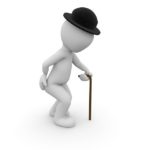As We Grow Older Our Bodies and Our Lives Should Continue to Improve Thomas Hanna
Have you ever said "I feel so stiff, it must be my age?" I'm betting that if you're over 40 years of age there's a good chance you have. It's such a common thing to say if you've felt your body stiffening up, becoming less flexible or have experienced ongoing muscle aches and pains.
So common in fact that we never really stop to think what this phrase actually means. If we do, we realise there is an implied message that to get older means an inevitable decline in our ability to move with ease as if ageing itself is the cause of our muscles becoming tighter and stiffer. But is this really true? And if not, why is it that so many of us end up feeling so stiff?
The Myth of Ageing
 In Thomas Hanna's book "Somatics" he starts with the riddle of the Sphinx: "What walks on four legs in the morning, two at noon, and three in the evening?" In Greek mythology Oedipus guessed right; a human being who crawls on all fours as an infant, walks on two legs as an adult but needs a cane in old age. So the idea of muscular physical decline as the years tick by has been around a long time and is deeply embedded in our culture. Hanna called this the "Myth of Ageing" which is not to imply that we don't age but rather, he wanted to debunk the assumption that age itself is the cause of this decline and that it is inevitable.
In Thomas Hanna's book "Somatics" he starts with the riddle of the Sphinx: "What walks on four legs in the morning, two at noon, and three in the evening?" In Greek mythology Oedipus guessed right; a human being who crawls on all fours as an infant, walks on two legs as an adult but needs a cane in old age. So the idea of muscular physical decline as the years tick by has been around a long time and is deeply embedded in our culture. Hanna called this the "Myth of Ageing" which is not to imply that we don't age but rather, he wanted to debunk the assumption that age itself is the cause of this decline and that it is inevitable.
So why do I get stiff then?
The most likely reason for your stiffness is much more to do with your muscles getting tighter & tighterand your inability to relax themvoluntarily.This build up of chronic muscle tension has nothing to do with age and can actually occur at any age under the right circumstances. Why we tend to feel it more as we get older is due to ongoing and repeated stressors throughout our life. It's the accumulation of stressors including accidents, injuries, major surgeries and illnesses, emotional/psychological stress and habitual ways we use our body on a daily basis (e.g. slumping at a computer) that cause our muscles to contract and tighten so frequently that we can no longer feel and sense it, nor voluntarily relax them back to their natural resting length. Hanna called this Sensory Motor Amnesia (SMA).
Sensory Motor Amnesia (SMA) – the missing link
It may sound a little scary but really Sensory Motor Amnesia (SMA) in essence means that the communication between your brain and  nervous system (the command centre for your muscles) and your muscles (sensory motor system) isn't working as effectively as it could. When this happens your brain loses some portion of it's ability to voluntarily control the muscles involved – you most likely have SMA if:
nervous system (the command centre for your muscles) and your muscles (sensory motor system) isn't working as effectively as it could. When this happens your brain loses some portion of it's ability to voluntarily control the muscles involved – you most likely have SMA if:
- Your muscles feel tense even when you're relaxing, having fun, not doing much – those shoulders, hips, back just won't relax
- You've tried various approaches (massage, chiropractor, stretching) but nothing has been able to relax the muscles long term
One of the most important things to realise is that SMA happens at the level of the brain & nervous system, it's a learned adaptive response to stressors and Hanna identified that there are 3 universal stress reflexes that all humans respond to stress within (more about these in future blog posts) which create full body patterns of muscular contraction. However, the good news is you can unlearn these patterns and once again experience relaxed & supple muscles with freedom of movement no matter what your age.
Hanna Somatic Movements – connect the brain to the muscles
 Because SMA happens at the level of the brain, we need to engage our brain in order to release the muscle tension and stiffness. Hanna Somatic movements are specifically designed to do this through a method called pandiculation. Movements are performed slowly, gently with full awareness of the internal body sensations in order to bring the muscles back under full voluntary control of your brain. They are pleasurable, yawn like movements that will leave you feeling more relaxed, supple and freer.
Because SMA happens at the level of the brain, we need to engage our brain in order to release the muscle tension and stiffness. Hanna Somatic movements are specifically designed to do this through a method called pandiculation. Movements are performed slowly, gently with full awareness of the internal body sensations in order to bring the muscles back under full voluntary control of your brain. They are pleasurable, yawn like movements that will leave you feeling more relaxed, supple and freer.
If you'd like to explore Hanna Somatics with me then please do get in touch. I offer Classes, Workshops, Skype sessions and One to One Clinical Somatics sessions. If you're experiencing a lot of muscle tension, stiffness and/or pain then the best place to start is with the one to one Clinical Somatics sessions as they are the most effective way to release your tension.
As Thomas Hanna said:
"As we grow older, our bodies – and our lives – should continue to improve, right up to the very end. I believe that all of us, in our hearts, feel that this is how life really should be lived."
Over To You
Are you aware of any particular daily habits that you have or ways of responding to stress that may be contributing to your own build up of muscle tension? What do you think of the "Myth of Ageing"? Please share below, I'd love to know your thoughts
mashburntheyinecaut.blogspot.com
Source: https://sensingwithin.com/ever-said-i-feel-stiff-must-age-read/
0 Response to "As We Grow Older Our Bodies and Our Lives Should Continue to Improve Thomas Hanna"
Post a Comment